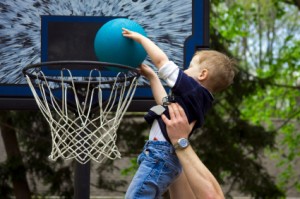Most parents feel proud to see their kid being a good friend. But kids aren’t born knowing about respect, cooperation and empathy. They learn from us. And we teach our kids a whole lot about friendship by the way we help them and let them help us. Because of a parent’s consistent love and support little kids often say “My mom/dad is my best friend!”

That's what friends are for.
But as they grow, their friendships get more complex and our lessons need to be more pointed. We’ve got to help them connect the dots and understand that friendship is a two-way street.
If your son or daughter is being bullied or in any way getting the short end of the friendship stick, you can help. Since (s)he’s desperately trying to figure out what friendship is about, it’s a perfect time for a calm, respectful sit-down discussion. You might say something like this:
Sweetheart, in a real friendship (the only kind worth having) both people need to treat each other with respect. If a friend is sometimes nice and sometimes not, then respect yourself enough to stand up and speak the truth.
It isn’t always easy to tell the truth, even to a best friend. But if you stay silent things are probably going to get worse. Also, if you keep your mouth shut when you’re hurting, you let your friend believe that you’re OK with what’s going on. You and I both know you aren’t OK with being laughed at or teased or ignored, so why let anyone think that you are?!
In case you’re wondering if speaking up guarantees that you and your friend won’t ever have any more problems, the answer is no. In fact, if you tell your friend that you’ve had it with being disrespected, (s)he may get angry. (S)he may accuse you of trying to wreck the friendship. (S)he may turn others against you. (S)he may do all of that and more!
Because I’m always honest with you, I’m letting you know there are risks in telling the truth. But real friends can take the truth because they should know you’d never intentionally hurt them. And the truth often strengthens a real friendship, so there’s that.
Sweetie, I love you… which is why I want you to understand, now while you’re in middle school and for the rest of your life, that you’ve got to be your own best friend. That means letting people know where you stand and never giving anyone permission to be mean to you or others.












Oh yes…I need to keep this as a reminder for myself and my children. They are only 5 and 3 right now but I really hope they make true and caring friends and that they, themselves become sincere, and caring friends. Thanks for a lovely post and reminder:)
Comment by Melissa (Confessions of a Dr.Mom) — September 16, 2010 @ 3:38 pm
That, together with modeling friendly, respectful behavior (including self respect), should work great.
My son is now having to speak his mind and dreading it. I might share your post with him.
Comment by Family Matters — September 16, 2010 @ 7:12 pm
I enjoyed reading this. My two oldest are now in high school but the middle school timeframe was such a difficult stage. I still have a 7th grader but he is homeschooled. I watch how they interact with each other. It can be brutal. I have shared this with my family. In addition to my personal blog noted above, I also write for Chesapeake Family Magazine in their About Teens blog. http://www.chesapeakefamily.com/Blog/About-Teens/
Comment by Shelley — September 17, 2010 @ 8:54 am
Great article, ending in a positive affirmation of the childs self worth. It’s certainly Been interesting with our two young daughters going through the transition between preschool to school. We actually used the bullying multimedia resources on our children to try and ensure they had a good open understanding of issues like bullying at a young age. We would love to see/ hear your thoughts Annie on the multimedia resource we developed.
Thanks Annie
Kath
http://www.bullyinginschool.org
Comment by Kath — October 11, 2010 @ 2:12 am